7 Probiotic Foods Scientifically Linked to Better Health
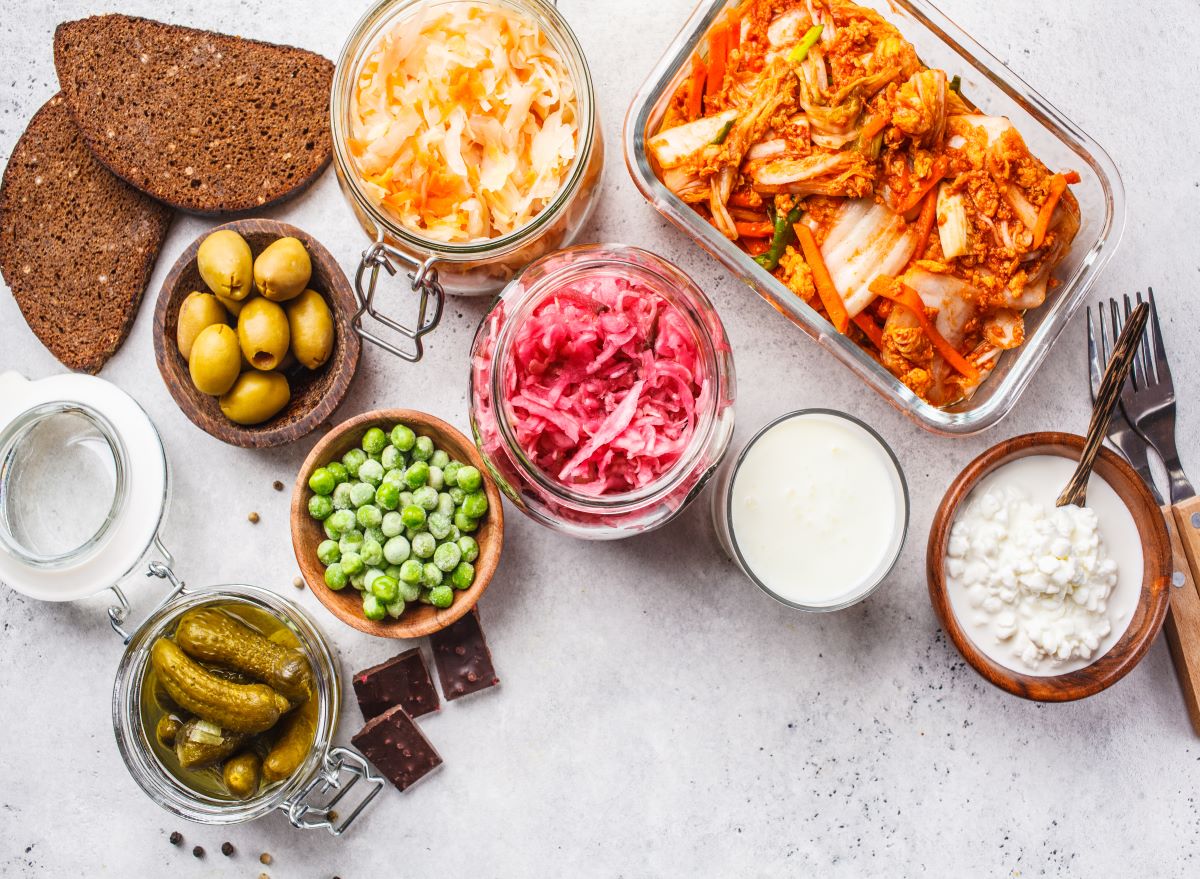
Gut health may seem like a trendy topic, but it’s far from a fad. Research over the years has linked the gut microbiome to a number of health outcomes, including diabetes, heart disease, gastrointestinal disease, and depression. If you want to improve your health, one of the best places to start is with the trillions of bacteria living inside your digestive tract. Keep them happy, and you’ll reap the rewards with a strong immune system, more energy, improved mood, and better overall health.
So how do you improve and maintain a healthy gut? One part of the equation is eating foods that help introduce more of the good bacteria, improving the diversity and amount of beneficial microbes in your digestive tract. Probiotic foods include various strains of beneficial bacteria that can colonize in your digestive system after you eat them. Some foods have naturally occurring beneficial bacteria that are multiplied through fermentation, while other foods routinely have probiotics added to them.
Keep reading to learn more about the benefits of probiotics, and for more healthy eating tips to support optimal gut health, find out What Yogurt Does for Your Gut.
What are probiotics & probiotic foods?
We often think of bacteria as a sure way to introduce sickness and attempt to steer clear of them with antibacterial soaps and hand sanitizers. Additionally, we do our best to follow safe food practices to minimize the amount we eat. While these practices are great for avoiding bad bacteria, you also want to do your best to introduce more good bacteria into your system—also known as probiotics.
Probiotics are bacteria and yeasts that have positive effects on the body. This beneficial bacteria can be found on every body surface, with an incredible amount colonizing in the digestive tract—anywhere from 10 to 100 trillion! Living among the good bacteria is plenty of bad bacteria. However, probiotic foods can help keep a positive balance in the gut, keeping the negative effects of the bad bacteria at bay.
Probiotic foods either naturally contain probiotics through the process of fermentation or have had bacterial strains added to them. Two of the most common strains of beneficial bacteria added to foods are lactic acid bacteria and Bifidobacteria. However, there are many other health-promoting strains naturally found in and added to foods.
Are all fermented foods probiotics?
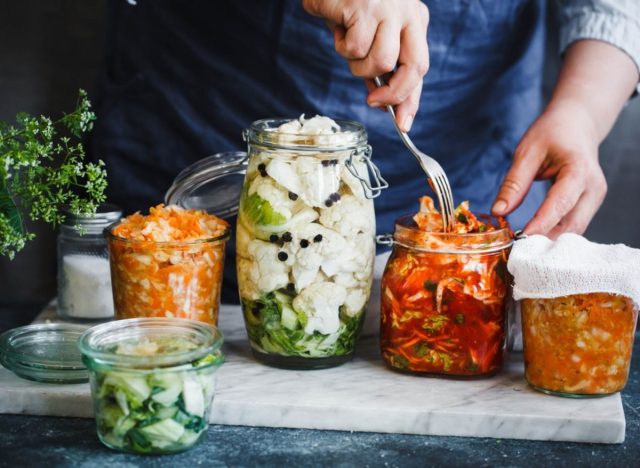
Fruits, vegetables, and grains all have naturally occurring bacteria on the skin, which multiply during the fermentation process. At some point in the production process, fermented foods will have varying amounts of beneficial yeasts or bacteria in them. Even so, this doesn’t necessarily make all fermented foods probiotics.
Many fermented foods lose their probiotics during processing. Foods like sourdough, chocolate, or heat-treated fermented vegetables, or sauerkraut don’t have live organisms by the time we eat them because of the heat used during processing. And while beer and wine are fermented, the yeasts and bacteria that were once present are removed before it reaches your hands.
A March 2020 study in Foods found that pressure-treating yogurt containing Bifidobacterium bifidum and Lactobacillus casei only slightly reduced the amount of active culture in the food. This suggests that fermented foods that are pressure treated instead of heat treated for preservation could still include beneficial bacteria.
Fermented foods that are typically eaten with beneficial bacteria present, like kimchi, kombucha, and tempeh, will have some amount of beneficial bacteria in them. Still, in many of these foods, the amount and strains of bacteria you get from eating them are unknown.
How probiotics can support your health
Overall, probiotics support a healthy gut microbiome, but each individual strain comes with its own potential health benefits, including improved mood, relieving constipation or diarrhea, and supporting the immune system. Probiotics and the gut microbiome are vigorously being researched, and new potential benefits are still being discovered.
The friendly bacteria in the gut creates a barrier, which helps to prevent bad bacteria from invading and making us sick. The probiotics also feed on prebiotics, certain undigestible fibers that we eat, and produce beneficial byproducts like short-chain fatty acids, which increase nutrient absorption and help fight inflammation.
The 7 best probiotic foods for gut health
Yogurt
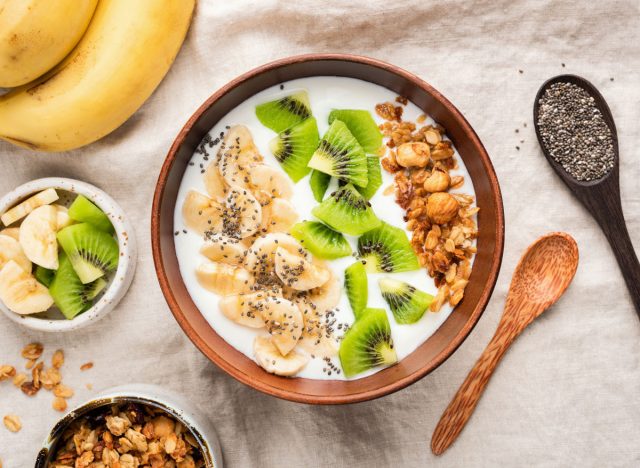
Yogurt is one of the most well-known probiotic foods. Live active cultures are added to milk, breaking down lactose and creating lactic acid. The fermentation of milk by the live active cultures gives yogurt its characteristic tangy taste and thick and creamy texture.
While all yogurt will have some amount of probiotics in them, they’re not all created equal.
“Look for ones with live cultures such as Lactobacillus bulgaricus and streptococcus thermophillus,” advises Dr. Shy Vishnumohan, PhD, APD, a food scientist and specialist pregnancy dietitian and nutritionist based in Australia. “Some brands even spell out the numbers of bacteria to guarantee you have enough of them to survive the acidic digestion process in the stomach.”
To emphasize the health benefits of regularly including yogurt in your diet, Dr. Vishnumohan references an April 2021 Nutrition Reviews article that analyzed 76 studies, showing a positive relationship between diets including yogurt and reduced risk of type 2 diabetes, heart disease, as well as breast and colon cancer.
Cottage Cheese
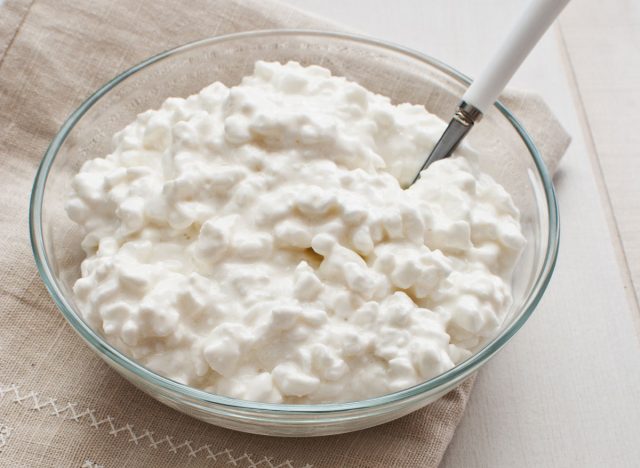
“Cottage cheese is an under-loved fermented food that can be a source of probiotics and can also be the base of your ice cream,” says gut health nutritionist Amanda Sauceda, MS, RD, in reference to the cottage cheese ice cream trend that’s taken TikTok by storm.
While not all brands of this curdled dairy have high levels of probiotics, one strain of lactic acid bacteria has been found in cottage cheese, explains Sauceda, referring to a December 2022 study in Scientific Reports that identified the strain and its antimicrobial properties.
If you’re looking to reap the benefits of probiotics from cottage cheese, choose a brand that uses processes to increase the potency of the beneficial bacteria. “To make sure it was made via fermentation look for live and active cultures on the label,” says Sauceda.
Miso
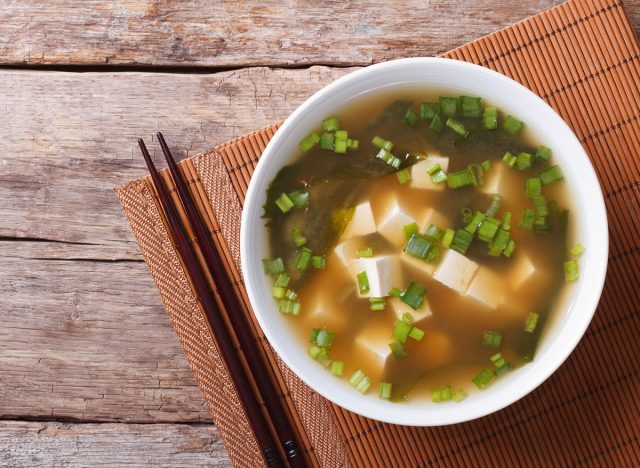
Miso can add a deep, savory, salty, umami flavor to any dish you add it to, making it a versatile and incredibly delicious condiment. But this fermented soybean paste has plenty of health benefits to offer too!
“Miso can be used in marinades, sauces, and dressings, but the most traditional way is miso soup,” explains Jennifer Akimoto, MAN, RD.
A September 2022 review in Food Science and Nutrition found that miso may contain properties that help fight cancer, high blood pressure, and inflammation, and regulate cholesterol, among other health benefits.
“Those who eat miso soup daily have been shown to experience fewer stomach illnesses and reflux,” says Akimoto, in reference to the study.
Sauerkraut
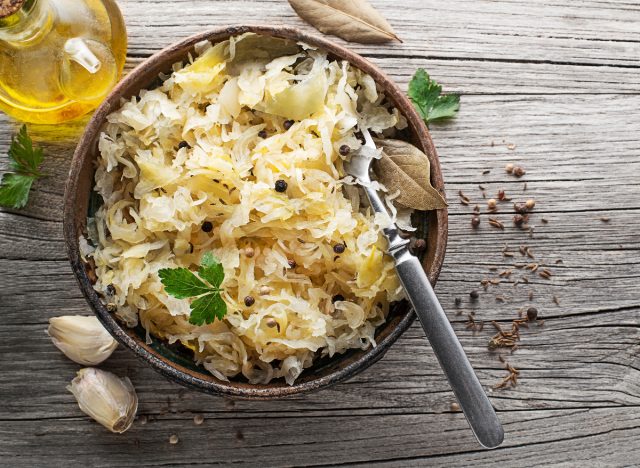
If you’re of European descent, you may have memories of smelly kitchens and sour-tasting cabbage being spooned on your plate on every holiday.
“Sauerkraut is a fermented cabbage dish that has been a staple in many European diets for centuries,” explains Maya Oueichek, MBA, RDN. “The beneficial bacteria in sauerkraut gives it its distinct tangy flavor, making it a popular topping.”
“Sauerkraut contains beneficial bacteria that improve digestion, reduce inflammation, and enhance immune function,” says Oueichek, referring to an April 2017 review in Current Opinion in Biotechnology.
Kefir
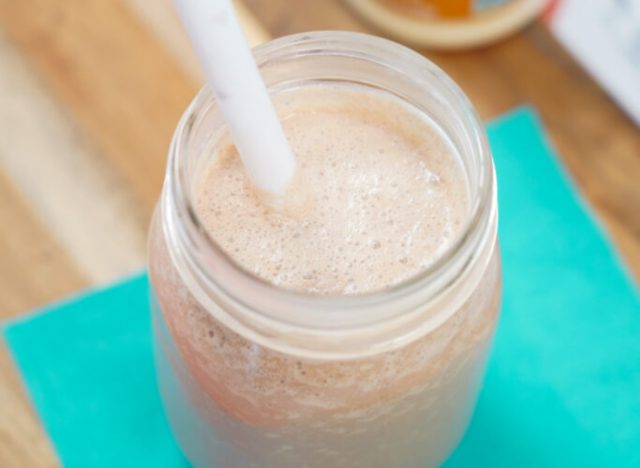
Yogurt isn’t the only fermented, probiotic-rich dairy product on the market. Kefir is similar to yogurt. However, it’s made with a different type of bacterial strain and has a slightly different texture and taste.
“You can easily enjoy [kefir] as a drink or in smoothies. Because of the fermentation process, it has a longer shelf-life than many other dairy foods,” explains Sauceda.
The difference between yogurt and kefir comes from the culture used to make them. Kefir grains are gelatinous granules that contain several different types of bacteria and yeast and help ferment milk, producing lactic and acetic acids. Lactic acid and other bioactive compounds in kefir have antimicrobial, anticancer, and immune-supporting properties.
Kimchi
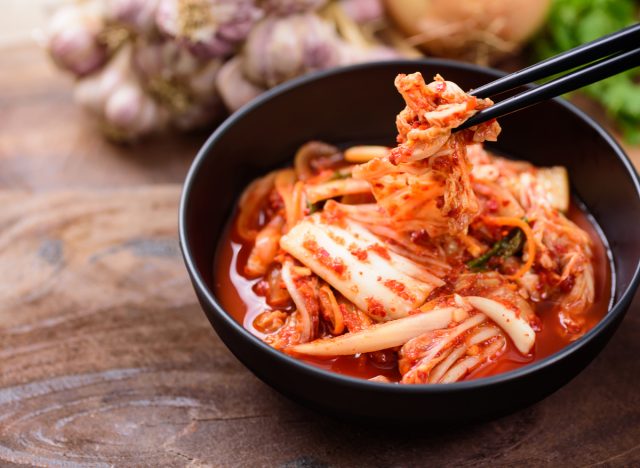
Kimchi is a traditional Korean food made through the fermentation of cabbage, radishes, garlic, ginger, and chili peppers.
“The fermentation process promotes the growth of beneficial bacteria known as probiotics that can help improve digestion and support immune health,” says Wan Na Chun, MPH, RD.
One specific probiotic strain found in kimchi called Lactobacillus plantarum has a high tolerance to gastric juices, antioxidant activity, and immune-enhancing effects.
Tempeh
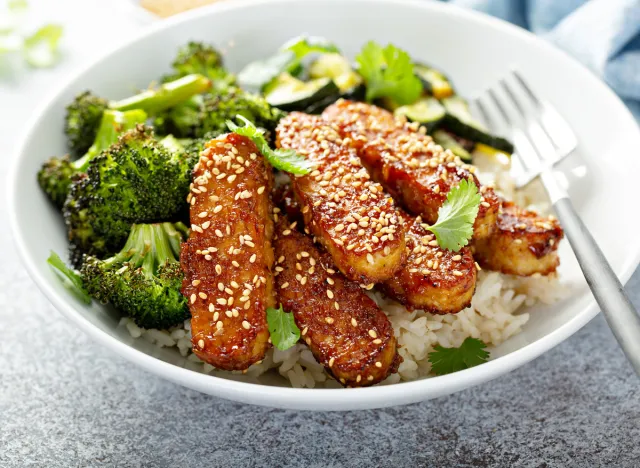
Tempeh is a fermented soybean product that’s high in protein and often eaten as a plant-based meat substitute. It’s rich in probiotics and has been found to improve cognitive function, which may be attributed to the microorganism’s effect on the gut microbiome.
A small study published in Dementia and Geriatric Cognitive Disorder found that older adults who ate 100 grams of tempeh daily for six months had improved global cognitive scores compared to the control group who did not eat tempeh.
Furthermore, a June 2022 study in the Frontiers in Aging Neuroscience isolated the probiotics from tempeh to see if the probiotics alone could influence cognition in a small group of older adults. Researchers found that 107 CFU/mL to 108 CFU/mL of the tempeh probiotic increased a combination of memory, learning, visuospatial, and verbal fluency. Meanwhile, the control group only saw improvements in memory.
- Source: https://www.ncbi.nlm.nih.gov/pmc/articles/PMC6682904/
- Source: https://www.ncbi.nlm.nih.gov/pmc/articles/PMC3667473/
- Source: https://www.mdpi.com/2076-3417/11/23/11204
- Source: https://www.ncbi.nlm.nih.gov/pmc/articles/PMC7142589/
- Source: https://www.ncbi.nlm.nih.gov/pmc/articles/PMC7230973/
- Source: https://pubmed.ncbi.nlm.nih.gov/32447398/
- Source: https://www.ncbi.nlm.nih.gov/pmc/articles/PMC9800376/?fbclid=IwAR3ihnWKADO7XyYvZB3jNH_5JzKyeA308XBop0EqrtuLV4n-pOJmiDoWjfg
- Source: https://pubmed.ncbi.nlm.nih.gov/36514754/
- Source: https://pubmed.ncbi.nlm.nih.gov/27998788/
- Source: https://pubmed.ncbi.nlm.nih.gov/34745425/
- Source: https://pubmed.ncbi.nlm.nih.gov/33080604/
- Source: https://www.ncbi.nlm.nih.gov/pmc/articles/PMC9263263/









